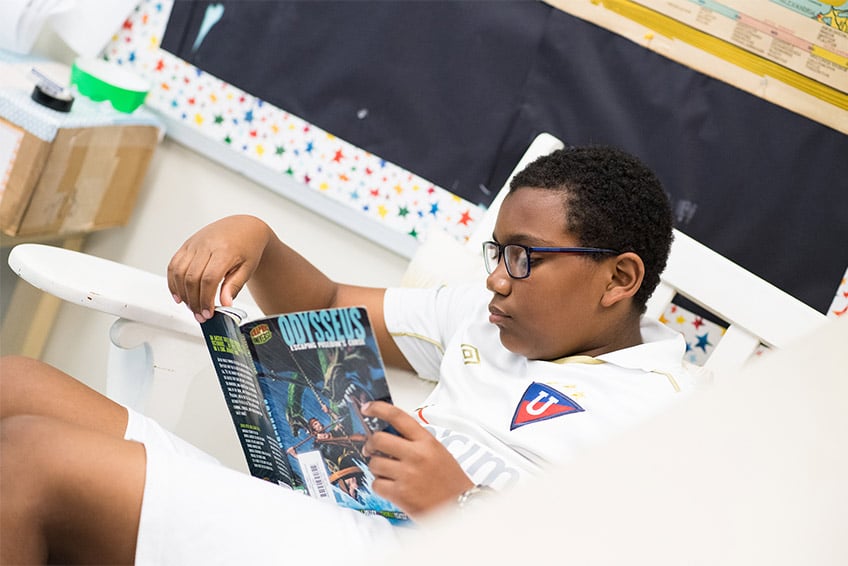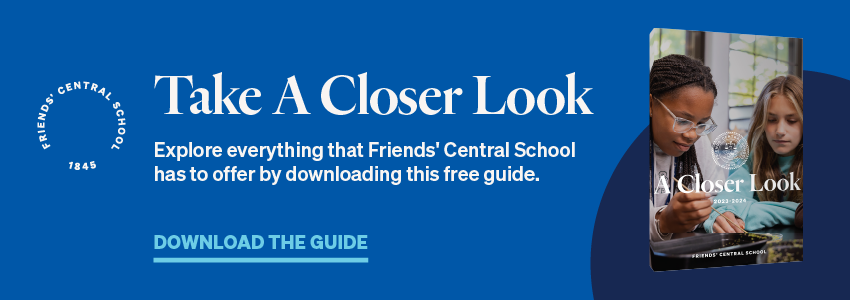
Teaching children to be independent learners is key to academic success now and in the future. The same skills necessary for students to have agency over their own earning are skills that will set them up for success throughout their school years. Fostering these skills and the confidence and built-in motivation that come with them helps children own their own education and gives them a greater sense of investment in their own learning.
Not only will these skills help your child become more effective in the classroom; they will serve them throughout their lives as they approach life with an openness and interest in continued learning. Whether for professional development or personal enrichment, learning is for life!
Free Downloadable Guide: Take a Closer Look at Friends' Central School
Below are some tips that families can use to help their children develop independent learning skills to serve them now and in the future.
What is independent learning?
When we talk about teaching children to be independent learners, what we mean is teaching them the skills that they need to take control over their own education. By developing this agency in them, they are empowered to truly “own” their educational path, setting them on the course of developing a lifelong love of learning.
This is important because your child will not always have someone—you, their teachers, their peers—to provide motivation or structure to their education. Eventually there will come a day when learning is optional as opposed to “forced” on them. Unless a student has developed internal motivation and agency, they may not choose to excel when no one is there to push them. Unless they have internalized a desire to learn more, they may not thrive.
Once students enroll in college, their success relies on their own drive and agency. Colleges expect students to go to class, do the reading, and write their papers, but college students don’t have anyone looking over their shoulders to make sure they do what they need to. Simply put, without self-motivation, few students truly excel in college and many don’t make it at all. Similarly, most professionals must continuously improve their skills and learn new ones in order to remain relevant in a changing workplace. This often involves completing training programs, earning advanced degrees, or simply learning on the side.
The first steps toward teaching your child to be an independent learner begin with giving them the opportunity to experience being independent in their studies.
5 Ways to Help Your Child Become an Independent Learner
1. Normalize asking for help.
The ability to recognize when you don’t understand something and the self confidence to ask for help are both central to being an independent learner.
While parents should encourage children to “figure things out” for themselves, it’s also important to teach children to recognize when they truly need help, and how to go about asking for that support—whether it be from their teachers, a tutor, or their peers. This recognition - understanding that they need help; followed by action - seeking help; will serve them in school and in life.
2. Let them falter or fail.
All of us falter or fail occasionally, so it’s important for our children to understand that the failure itself is not a defining moment. The defining moment should instead be how they respond to this failure.
With this in mind, it’s important to let your child push through their struggles and occasionally fail. Not only will this help them develop resiliency, but it will also give them an important learning opportunity by allowing them to reflect upon what went wrong and how they might do things differently the next time.
This doesn’t, of course, mean that you should be disengaged when your child fails. It simply means that instead of stepping in to solve the problem for them, you are stepping in to offer guidance that they can use to solve the problem themselves or prevent it from happening in the future. Help them understand what went wrong and what they might do differently next time. Ask them:
- How will you figure this out?
- What resources are available that you maybe didn’t leverage this time?
- What was the cause of the issue?
This self-reflection is a key part of being an independent learner, and something that all children must learn.
3. Reinforce good habits.
Being an independent learner requires certain skills, such as time management and organization. Learning time management skills will allow your child to be better able to understand the time and effort that will go into a task or project; learning organizational skills will empower them to actually get those things done. Time management and organization are essential skills for success.
There are many ways that you can reinforce these habits. One important way is to provide structure and routine in their daily lives, such as around sleep, nutrition, and exercise, that back into those skills. Another is to talk through projects and assignments and encourage your child to map out a plan, beginning with the final product and due date.
4. Recognize their strengths.
One common characteristic shared by many independent learners is the fact that they are confident about their abilities. When a student believes that they are capable of achieving their goals, they are much more likely to demonstrate the resilience they may need to follow through with their plans and truly own their education.
With this in mind, it’s important that we as parents and educators recognize the strengths and capabilities of our children to empower them. At the same time, we need to help them identify what I call their growing edges: Areas where things don’t necessarily come as easily. By teaching our children to identify these areas, we empower them to dedicate more of their own time, energy, and resources in working harder to improve their capabilities.
5. Guide, but don’t manage.
Finally, parents must realize that their children are best served when parents approach their child’s education not through the lens of a manager, but through the lens of a mentor. You want to direct your child in understanding their weaknesses and in using the available resources to get better; you don’t want to step in and find the answer for them or do something in their place.
An effective means of doing this is to be a “guide on the side.” Instead of taking over a computer and editing their paper directly, for example, you might read the paper aloud to them and ask them to identify areas that might need revision. Or you might work through a math problem with them instead of simply doing it for them while they follow along.
It Takes A Team
By following the advice above, parents can go a long way in helping their children become more independent learners. Ultimately, however, fostering these skills will require a multi-pronged approach. Ideally, your child’s school and teachers will also be working toward the same goal of imparting independence in your child.
Here at Friends’ Central School, for example, we work to cultivate a sense of self-advocacy in all of our students. We highlight that asking for help is normal and important. We teach students how to advocate for themselves, understand what they already know, and understand what resources they have at their disposal and how to use them. We also make it a priority to partner with families so that parents will truly understand when they should be more engaged and when they can start to back away in order to allow their child to develop their independence.



